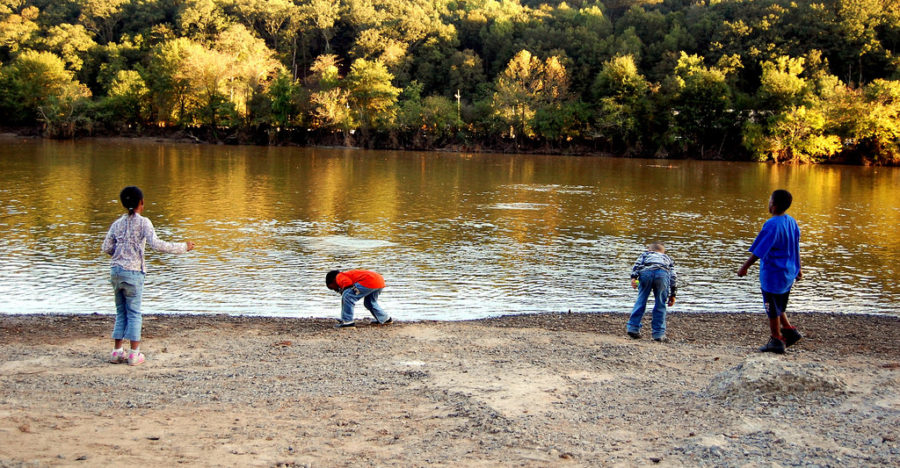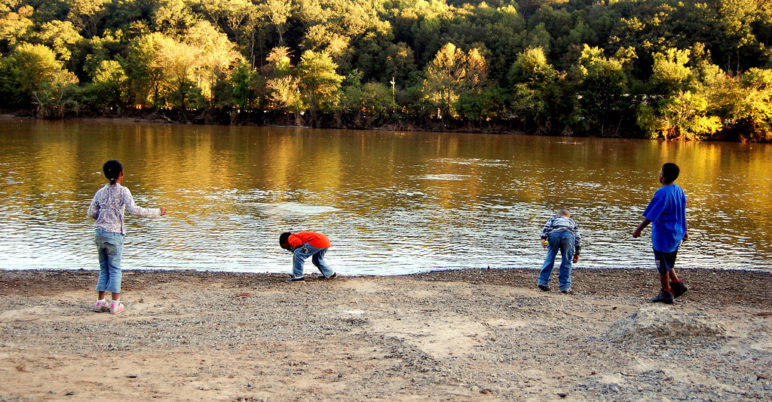Kristin
Another lens on the Big Sort: rural communities put a lot of resources into helping promising kids get out and fulfill their potential. Those kids get out, gain skills, experience the world. The other kids get left behind in their hometown with dwindling work opportunities and shrinking populations. As this graph from the article shows, those who leave home have more opportunities to make money than those who stay.
Tarika
A year-and-a-half ago, I wrote about how the fossil fuel industry is using your child’s classroom to indoctrinate children about their polluting products. This week the Center for Public Integrity published a full article on the industry’s push into K-12 education. Oil’s Pipeline to America’s Schools details how the industry is sending our underfunded schools free books and “educational materials,” as well as providing free teacher trainings in the name of STEM education. A first-grade classroom in Oklahoma, where a state agency funded by the oil and gas industry has spent $40 million on K-12 education materials with a pro-industry slant, embraced the indoctrination and won a visit from Republican lawmakers.
Dressed in suits, the Republican lawmakers read aloud from “Petro Pete’s Big Bad Dream,” a parable in which a Bob the Builder lookalike awakens to find his toothbrush, hardhat and even the tires on his bike missing. Abandoned by the school bus, Pete walks to Petroville Elementary in his pajamas.
“It sounds like you are missing all of your petroleum by-products today!” his teacher, Mrs. Rigwell, exclaims, extolling oil’s benefits to Pete and fellow students like Sammy Shale. Before long, Pete decides that “having no petroleum is like a nightmare!”
Oklahoma is not alone. A national energy education program funded by oil companies tells children that a little global warming “might be a good thing.” An Ohio teacher training program shows science educators how to give a lesson where they “frack” the filling out of Twinkies. I think Yale’s Anthony Leiserowirtz is right on the money about this propaganda when he says in the article that it violates a trusted relationship between teacher and student.
Here’s an update on the situation in Qatar, the world’s largest LNG exporter, for those who are watching the LNG market and LNG developments in our region:
- Qatar has stopped producing helium. It’s the world’s second-largest helium exporter, producing 25% of the world’s demand.
- The Pentagon just inked a $12 billion deal to sell F-15 fighter jets to Qatar but the President’s tweets side with the UAE and Saudi Arabia. Analyst Amir Madani suggests in an article over at The Huffington Post that the reason for the conflicting messages may be a back-door deal with the Saudis to get Qatar’s natural gas.
- The conflict may truly be about ostracizing Iran. (More on that)
- The New York Times wrote a history of the Saudi-Qatar rivalry that is a very informative read.
- The most entertaining development yet: NPR reports that a Qatari businessman plans to spend $8 million to airlift 4,000 cows to the country now that its neighbors have stopped food exports to Qatar. The country currently imports 80% of its food.
Eric
Everything you always wanted to know about duck sex (but were afraid to ask) is at Der Spiegel. For example:
…we discovered that the genitalia of ducks regress and regrow each year, so that a 10- or 15-centimeter penis in the summer will reduce to less than 1 centimeter in the winter and then grow back the next year.
This is not even close to the most disturbing fact available at that link.
That murder you think you committed? Maybe you didn’t actually do it. The New Yorker takes a look at the extreme unreliability of our memories:
The situation is a study in the malleability of memory: an implausible notion, doubted at first, grows into a firmly held belief that reshapes one’s autobiography and sense of identity…
If memory is like a house, it is one that is constantly under construction. As the cognitive psychologist Elizabeth Loftus put it, “Memory is born anew every day.” We piece together fragments of recollection, shaped by beliefs and impressions, and unwittingly embellish and invent our own pasts.
Human evolution freaks me out. This feature-length story at Vox examines what it means to be human and pays a visit to our long-lost cousins (with whom we interbred) in the forking paths of our species’ development.
Kenan Malik makes the case for cultural appropriation.
Bellingham got stinky recently. Sightline research fellow Michael Riordan explains how a “burping” oil tanker anchored offshore was the culprit.
Aven
In this week’s edition of things to be hopeful about, I present a new method for recycling plastic, using a natural reagent derived from coconut oil, a technique for converting carbon dioxide emissions into liquid fuel cheaply and efficiently, and a model for overcoming cognitive resistance to challenging facts.
The model comes from research on measles vaccination rates in California after the outbreak at Disneyland in 2014, which inspired a new law barring exemptions for children attending public schools. Anti-vaccination activists did their best to kill the bill, but the use of compelling visualizations that simulated the spread of an outbreak in people’s own towns and cities appears to have turned the tide in favor of stricter vaccination rules.
And speaking of the bill: although opponents predicted that little would change in the way of vaccination rates while public education would suffer as parents pulled their unvaccinated kids out of school, it turns out the exact opposite has happened: since the law went into effect last summer, vaccination rates have rebounded to their highest levels while school enrollment has continued to increase. I think there could be some important lessons here for other issues that involve the scientific literacy of average citizens—say, for example, climate change.
And finally, a vision for creating nature-rich cities, spawned by the author of the book Last Child in the Woods. Talking about urban planning has been a real downer for me recently, as Seattle continues to seethe and moan about HALA and skyrocketing housing prices, but I think this writer might be onto something:
The good news is that this is a vision that many people can agree on. Our children’s disconnect from nature may be the only current cultural issue that brings together people who don’t agree on much of anything else. Pediatricians, developers, urban planners, liberals, conservatives: Once they get to the same table and start talking about it—and start remembering their own childhood connections to nature—they open up to each other and to plans for change.









